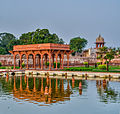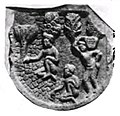The Gardening Portal

Gardening is the process of growing plants for their vegetables, fruits, flowers, herbs, and appearances within a designated space. Gardens fulfill a wide assortment of purposes, notably the production of aesthetically pleasing areas, medicines, cosmetics, dyes, foods, poisons, wildlife habitats, and saleable goods (see market gardening). People often partake in gardening for its therapeutic, health, educational, cultural, philosophical, environmental, and religious benefits. Gardening varies in scale from the 800 hectare Versailles gardens down to container gardens grown inside. Gardens take many forms, some only contain one type of plant while others involve a complex assortment of plants with no particular order. (Full article...)
Horticulture is the art and science of growing plants. This definition is seen in its etymology, which is derived from the Latin words hortus, which means "garden" and cultura which means "to cultivate". There are various divisions of horticulture because plants are grown for a variety of purposes. These divisions include, but are not limited to: gardening, plant production/propagation, arboriculture, landscaping, floriculture and turf maintenance. For each of these, there are various professions, aspects, tools used and associated challenges; Each requiring highly specialized skills and knowledge of the horticulturist. (Full article...)
General images -
Selected article -

In the history of gardening and landscaping, a canal is a relatively large piece of water that has a very regular shape, usually long, thin and rectangular. The peak period for garden canals was the 17th and 18th centuries, by the end of which less formal water features were in favour, in the style of the English landscape garden. It is distinguished from a garden pond or lake by its shape, and typically falls somewhere between the two in area. It might be wholly artificial, created by diverting and damming a stream, or based around a natural water feature which is landscaped. Usually it appears to be enclosed, though in fact water passes in and out by channels below the surface. The edges are often walled, and the water relatively shallow.
Traditionally, in England the canal has been associated with the Dutch garden style of the later 17th century, especially from about 1690 to 1720, though this has been challenged in recent years. There was also a tradition of canals in the French formal garden style, culminating in the huge four-armed Grand Canal that dominates the bottom of the Gardens of Versailles, made in 1662–68, the main branch 1585 metres long and 122 wide. (Full article...)Selected image

Related portals
Did you know -
- ... that a "bat ensnared by a plant" was discovered in the garden of the Palestine Museum of Natural History?
- ... that Ardwall House has a garden ornament in the form of an early mediaeval Pictish slab inscribed with a Celtic cross?
- ... that in 2023, a sculpture garden in Praunheim displayed abstract works by Hans Steinbrenner from different periods of his life, and corresponding works by his friends and students?
- ... that the Akinada Tobishima Kaido, an island-hopping road, was named after its resemblance to stepping stones in a garden?
- ... that Nizza in central Frankfurt is one of the largest gardens of Mediterranean plants north of the Alps, thanks to its very warm microclimate?
- ... that the Shakespeare garden in Wessington Springs, South Dakota, was the first of its kind in the state?
- ... that Nusrati attributes the virtues of a good ruler to his patron Ali Adil Shah II in The Rose Garden of Love?
- ... that none of the actors in Poppy Garden, a film depicting a father and son's struggle for survival during the Colombian conflict, had previously acted in a film?
Things you can do
- This list is transcluded from the tasks list page. To edit the list, click here
 |
Here are some tasks awaiting attention:
|
WikiProjects
Topics
Categories
Associated Wikimedia
The following Wikimedia Foundation sister projects provide more on this subject:
-
Commons
Free media repository -
Wikibooks
Free textbooks and manuals -
Wikidata
Free knowledge base -
Wikinews
Free-content news -
Wikiquote
Collection of quotations -
Wikisource
Free-content library -
Wikiversity
Free learning tools -
Wiktionary
Dictionary and thesaurus
































































































